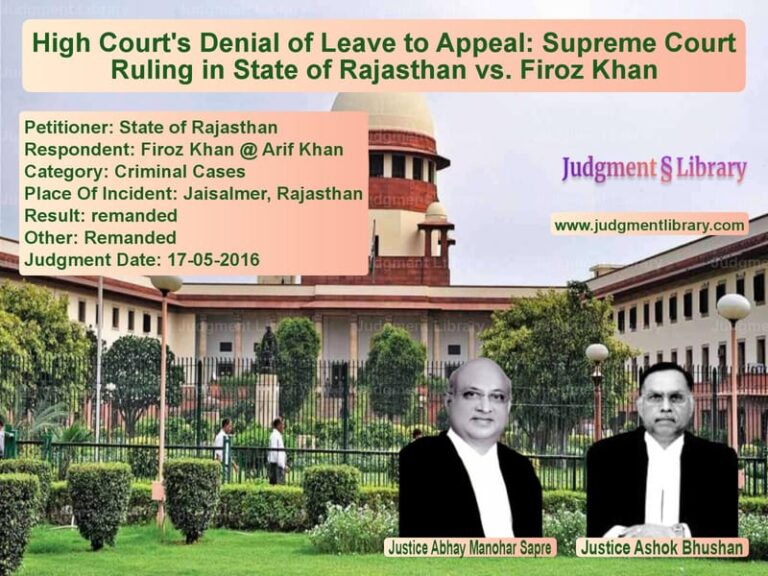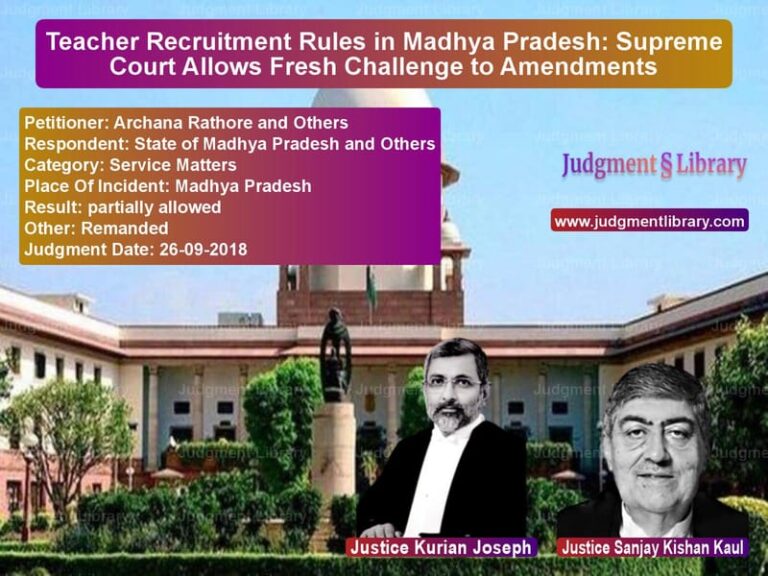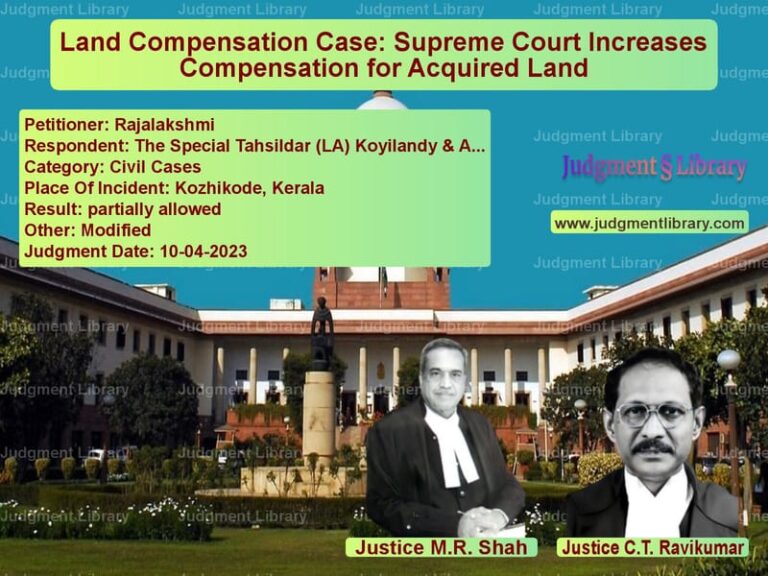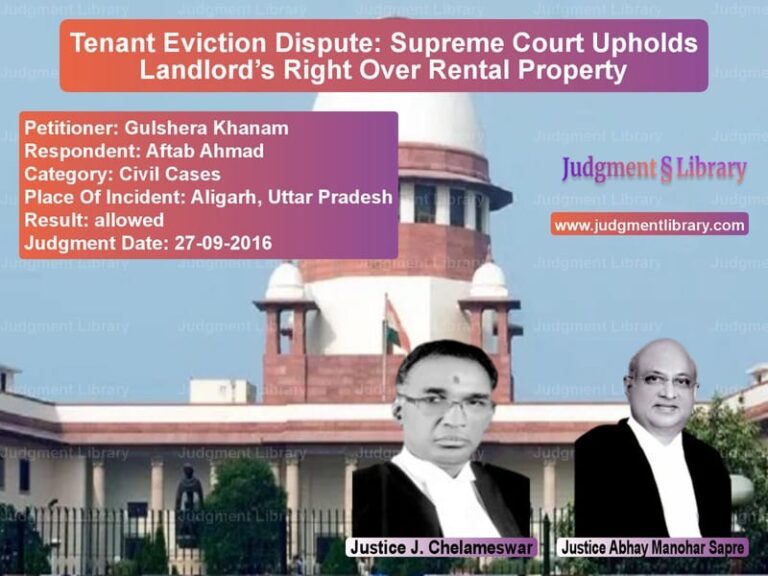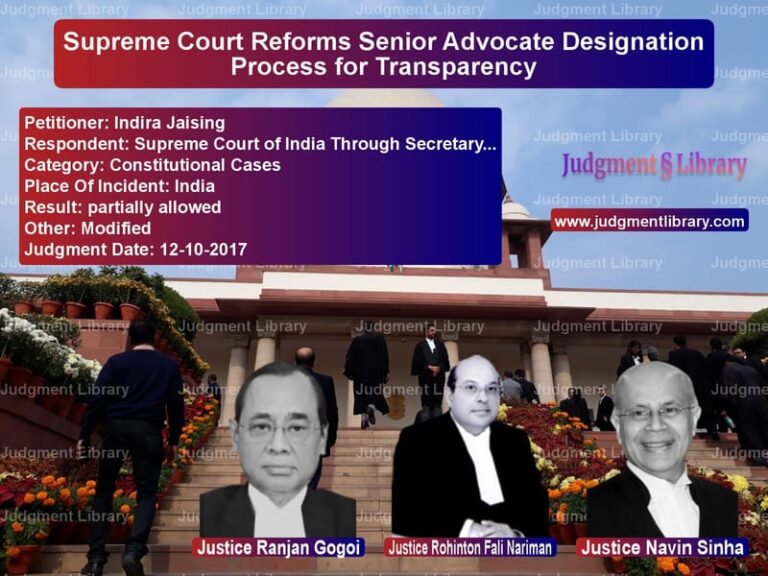Land Acquisition and Property Rights: Supreme Court’s Landmark Ruling
The case of B. K. Ravichandra & Ors. vs. Union of India & Ors. revolves around the prolonged occupation of private land by the government, raising critical constitutional and property rights concerns. The appellants, legal heirs of the original landowner, sought relief from the Supreme Court against the continued possession of their land by the respondent Union of India despite the expiration of the legal requisition period.
The core issues in this case were:
- Whether the government could continue occupying private land without proper acquisition.
- Whether the petitioners were entitled to the return of their land.
- The validity of compensation granted over an extended period.
Background of the Case
The dispute dates back to the 1960s when the Union of India requisitioned the disputed land under the Defence of India Act, 1962. The appellants’ predecessor, the original landowner, handed over possession under protest. The government continued holding the land even after the emergency period ended. Over the years, extensions under different legal provisions were used to justify the continued possession.
The appellants challenged this prolonged occupation, stating that their right to property under Article 300-A of the Constitution had been violated. They claimed that the government failed to initiate legal acquisition proceedings, making its occupation of the land unlawful.
Arguments of the Petitioners
The petitioners presented several arguments before the Supreme Court, including:
- The government had no legal basis to retain the land beyond the originally sanctioned requisition period.
- Prolonged possession violated their fundamental right to property under Article 300-A.
- Despite repeated demands, the government failed to either return the land or acquire it under the appropriate legal framework.
- The government’s continued possession was arbitrary and constituted an abuse of power.
“The fundamental principle in a democratic society is that no individual can be deprived of property except by legal authority. The prolonged occupation of the land by the government is unlawful, unjust, and unconstitutional.”
Arguments of the Respondents
The respondent Union of India countered the petitioners’ claims, arguing that:
- The land was being used for public purposes, and the petitioners had no immediate right to reclaim it.
- Compensation was duly paid for the extended period of requisition.
- The government had followed due process under the Requisitioning and Acquisition of Immovable Property Act, 1952.
- The appellants, by accepting compensation, had implicitly agreed to the government’s continued possession.
“The occupation of the land was never unauthorized, as due process was followed in accordance with the law. The appellants have no valid claim to immediate restoration.”
Supreme Court’s Observations
The Supreme Court, after a thorough examination of the legal provisions and past rulings, observed that:
- The right to property, though no longer a fundamental right, is still a constitutional right protected under Article 300-A.
- Requisitioning is a temporary measure and cannot be used indefinitely to deprive an owner of their land.
- “To permit the state, whether the Union or any state government, to assert that it has an indefinite or overriding right to continue occupying one’s property—bereft of lawful sanction—whatever be the pretext, is no less than condoning lawlessness.”
- The government’s continued occupation was arbitrary and violated constitutional protections.
Judgment of the Supreme Court
The Supreme Court ruled in favor of the appellants and passed the following orders:
- The Union of India must vacate the land within three months.
- The government must initiate fresh compensation proceedings, if necessary, for the period of unauthorized occupation.
- The petitioners are entitled to fair compensation based on the capital value of the land.
- If the government wishes to retain the land, proper acquisition proceedings must be initiated.
Impact of the Judgment
The ruling reaffirmed the constitutional guarantee against arbitrary state action in property matters. The Supreme Court emphasized that the government cannot indefinitely occupy private property without following due process. This judgment sets a precedent for similar cases, ensuring that property rights are safeguarded against government overreach.
Conclusion
This case highlights the importance of property rights under the Indian Constitution. The Supreme Court’s ruling serves as a reminder that the state must act within legal parameters when dealing with private land. The verdict ensures that landowners are protected from arbitrary government occupation and that compensation must be just and fair.
Petitioner Name: B. K. Ravichandra & Ors..Respondent Name: Union of India & Ors..Judgment By: Justice Indira Banerjee, Justice S. Ravindra Bhat.Place Of Incident: Bangalore, Karnataka.Judgment Date: 24-11-2020.
Don’t miss out on the full details! Download the complete judgment in PDF format below and gain valuable insights instantly!
Download Judgment: B. K. Ravichandra & vs Union of India & Ors Supreme Court of India Judgment Dated 24-11-2020.pdf
Direct Downlaod Judgment: Direct downlaod this Judgment
See all petitions in Property Disputes
See all petitions in Compensation Disputes
See all petitions in Landlord-Tenant Disputes
See all petitions in Judgment by Indira Banerjee
See all petitions in Judgment by S Ravindra Bhat
See all petitions in allowed
See all petitions in supreme court of India judgments November 2020
See all petitions in 2020 judgments
See all posts in Civil Cases Category
See all allowed petitions in Civil Cases Category
See all Dismissed petitions in Civil Cases Category
See all partially allowed petitions in Civil Cases Category



